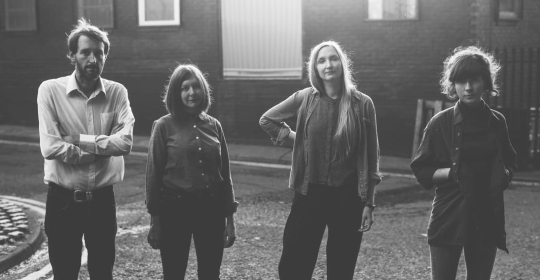fath*om
noun: a unit for measuring the depth of water
verb: to understand or find an explanation for something
-- Oxford Learner’s Dictionaries
The Furrow Collective's Fathoms is the group's third full-length album, and as on previous releases, the band's plumbs traditional music in an unsparing, contemporary manner. Comprised of four sterling musicians – Lucy Farrell (voice, viola, tenor guitar, percussion), Rachel Newton (voice, electroharp, fiddle, piano, percussion), Emily Portman (voice, banjo, concertina, harmonium, percussion), and Alasdair Roberts (voice, acoustic and electric guitars, banjolin, piano, harmonium) – The Furrow Collective brings its members' English and Scottish roots to the table.
One of the hallmarks of English traditional singing, espoused by Shirley Collins, is that the singer should not get in the way of the song. The result is that the singer is not exactly dispassionate about the tale being spun, but that she or he serves as a vessel for it. Moralizing is left to the listener; but the singer is not just a by-stander, and she can ornament a song with personality and emotive qualities. For a collective comprised of supremely talented musicians, it is also necessary to adhere to an ego-less approach in a combined venture for joint efforts to rise above any one individual. With the Furrow Collective the songs speak plainly, and the group works as one; and yet, experimentation is key to resuscitating the chosen songs and giving them room to breathe and haunt the modern mindset.
The liner notes for Fathoms carefully chart the provenance for each song. Traditional songs, as the result of communal mouth-to-mouth passing-ons and revisions, are usually not attributed to a particular songwriter. But, where one hears and learns a song may come from the oral tradition, or – in a technological world – through printed manuscripts and recordings. Artists may make their own revisions to texts, combining versions and editing as seen fit, and so the tales behind the songs contribute to the lineage of stories and serve to further situate the process within the folk tradition.
For this outing, The Furrow Collective begin with "Davy Lowston," a New Zealand song learned from Martin Carthy and Dave Swarbrick's Byker Hill (1967). The song describes a sealing trade venture that goes horribly awry, as the sealers of the brig Active were never heard from again. The track sets the tone for Fathoms, with Farrell, Newton, Portman, and Roberts harmonizing before drones of fiddle, concertina, and harmonium underpin the tragic tale about a "pitiful place to die," warning listeners to "never seal, never seal, never seal."
"Davy Lowson" segues straight into Alasdair Roberts' singing of "The Dark-Eyed Gypsies," where guitar and concertina underpin his vocals. Farrell, Newton, and Portman well up with "Gypsies-o, Gypsies-o," and the effect adds an old-timey feel as banjo is added to the mix. "False Lover Won Back" builds on a starker, more strident use of strings. Bass notes add a swelling bottom whilst banjo twinkles in the background, offset by percussion that sounds as if tin cans are being scraped.
The Furrow Collective's lovely, sun-drenched version of the Copper Family's "Write Me Down" (also known as "The Wedding Song") emerges in honey-sweet, dappled harmony. And yet, the courtship described is not easy, with the young woman at first scorning the suitor's advance, stating that she does not "mean or intend at all / To be at any young man's call."
Their version of "Write Me Down" was based on Cecilia Costello's (1883-1976) version of the song. Costello also influences the group on other tracks, such as the stunning closing track "I am a Maid that's Deep in Love," a song which concerns a cross-dressing sailor seeking her true love which the group joins to the a capella "Our Ship She's Ready."
"The Cruel Grave" and "Down By The Greenwoodside" both prove to be particular highlights on Fathoms. "The Cruel Grave," sung by Rachel Newton, is structured over a throbbing electroharp pulse, palpably rendering the spookiness of the song. "Down By The Greenwoodside" is simply brilliant, and again Newton's voice shines. A repetitive, soft piano line serves as the foundation of this version, while Roberts' guitar adds in some effective squeals and distortion that bend the music while the harmonies softly underscore the tragedy of the haunting and revelation of filicide. Throughout, Andy Bell's production of this music is a marvel: the instruments never detract from the tunes, and the groups' voices - individually and collectively - hold center stage.
If we are to grant that 'human nature' exists, then traditional music raises interesting questions about our innermost being. Ancient tales of love and desire, hardship and cruelty, bloody murder and confession still strike us as recognizable. We return to them again and again, as such songs deeply delve into the human experience. They provide insights and reveal something constant to us about ourselves across time. On Fathoms, The Furrow Collective cast a line into the wake of tradition, drawing out its naked beauty. - Lee Blackstone
Find the band online
Photo by Seth Tinsley
Further listening:
Leveret
Trio Dhoore
|
